Scenario planning software for small businesses
Scenario planning empowers business owners to identify outcomes and impacts, and to evaluate decisions based on positive and negative possibilities. This process is integral to the success of a small business. By visualizing risks and opportunities, and modeling profitability accordingly, you can become proactive and steer toward desired outcomes.
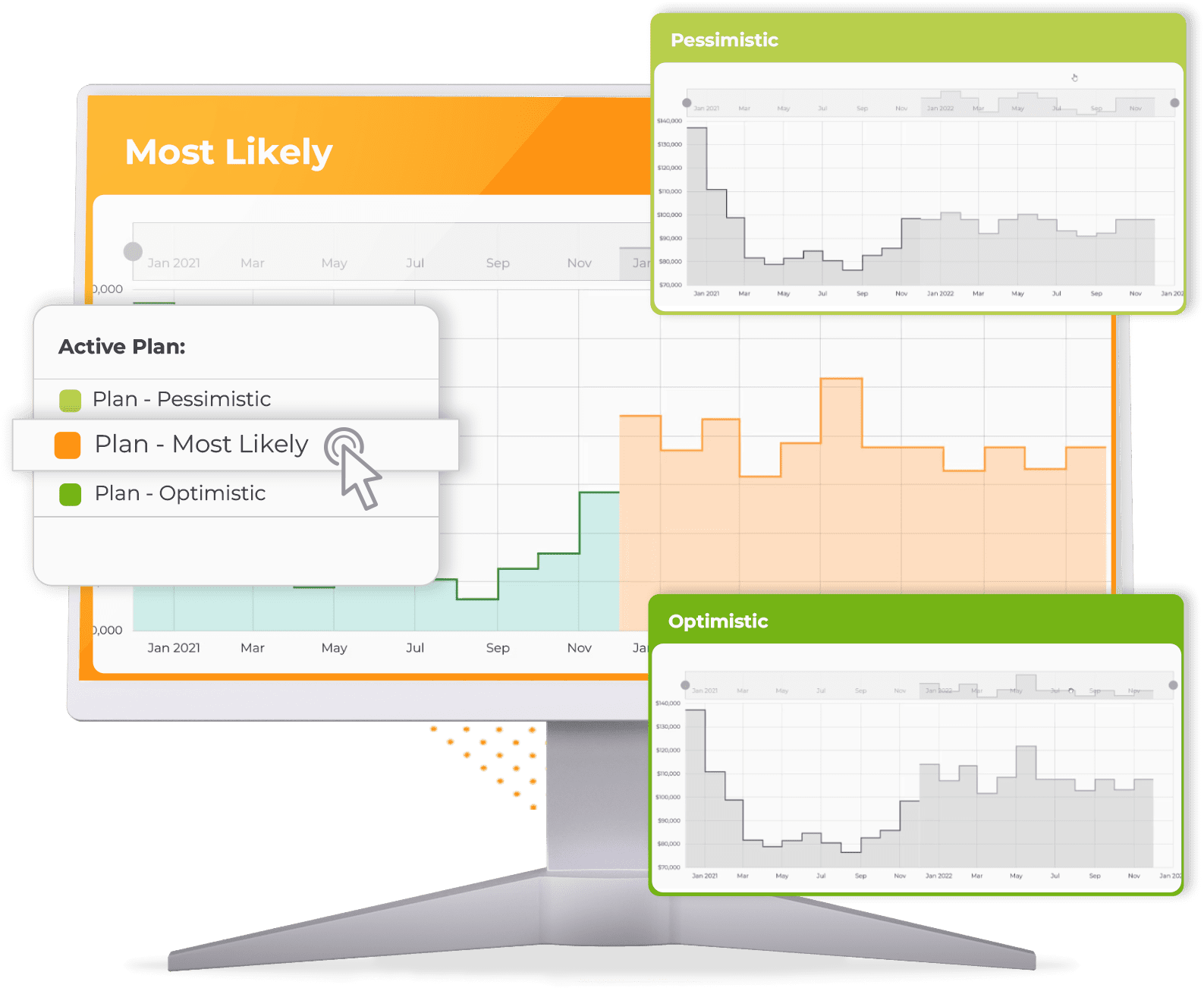

The need for efficient strategic thinking is most obvious in times of accelerated change when the reaction time of the organization becomes crucial to survival and growth.”
—Kees van der Heijden, Scenarios: The Art of Strategic Conversation
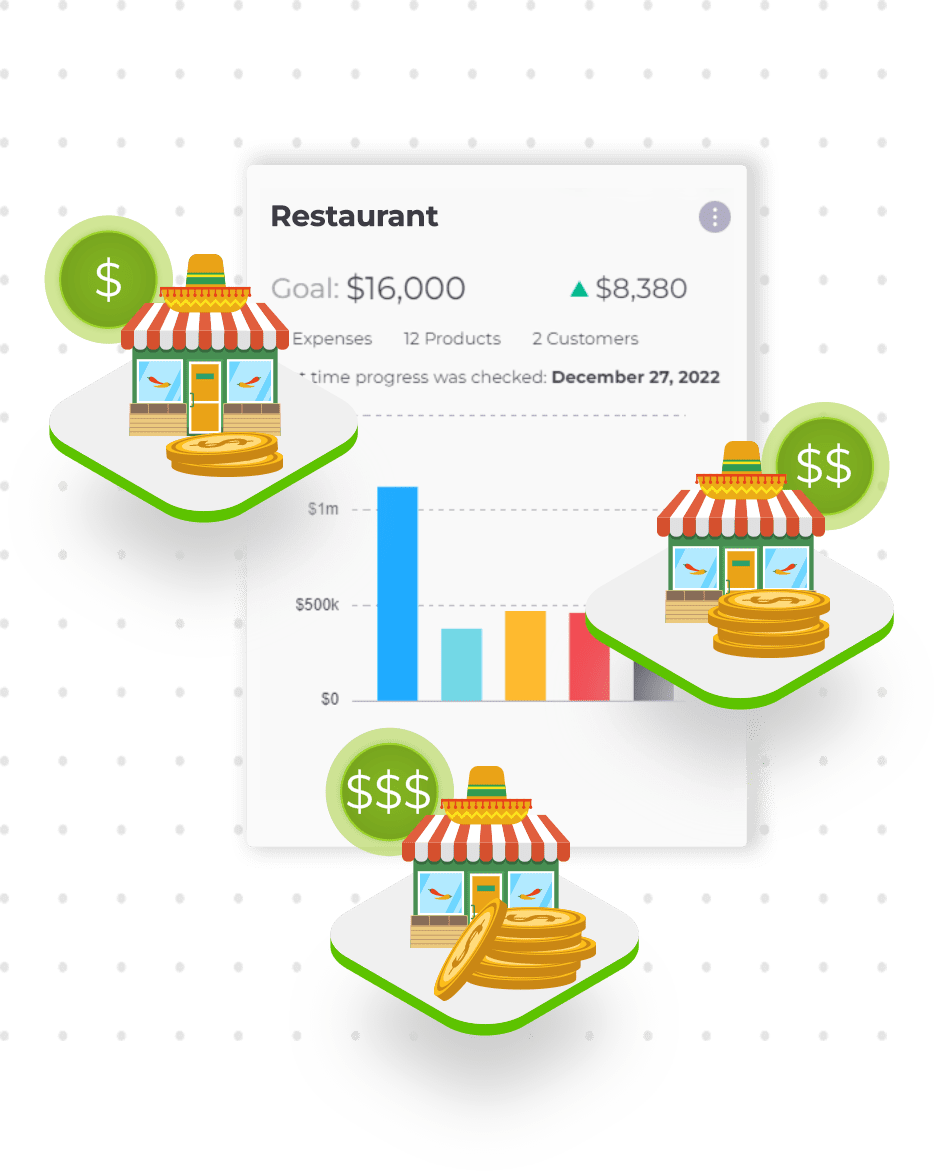
What is scenario planning?
Scenario planning is a type of thinking or computer modeling that allows business owners, project managers, and other decision makers to peer into the future and make better forecasts. It involves creating a financial model based on a potential future.
The scenario process involves asking the following two questions.
- What could potentially occur? This is the scenario itself.
- What would be the impact on my business if it did occur? This often involves looking at “best case,” “most likely,” and “worst case” outcomes.

Major business decisions can be scary.
Dynamic scenario planning helps you sort a great opportunity from a pitfall. With Profit Frog, you can steer your business toward growth and away from getting mired down.
Our scenario planning software lets you model a range of possible outcomes and impacts. Then you can steer your company toward best-case scenarios while preparing for worst-case ones.
Learn where to allocate your resources and when to back down from an investment
Be strategically and financially prepared for a worst-case scenario and mitigate its potential impact
Identify potential risk and turn it into gain
Recognize and seize amazing opportunities
Gain confidence in your decision-making skills by preparing for things you can’t control
Be ready for disruptive change and take advantage of it rather than being blindsided by it
Have your business strategy be proactive rather than reactive
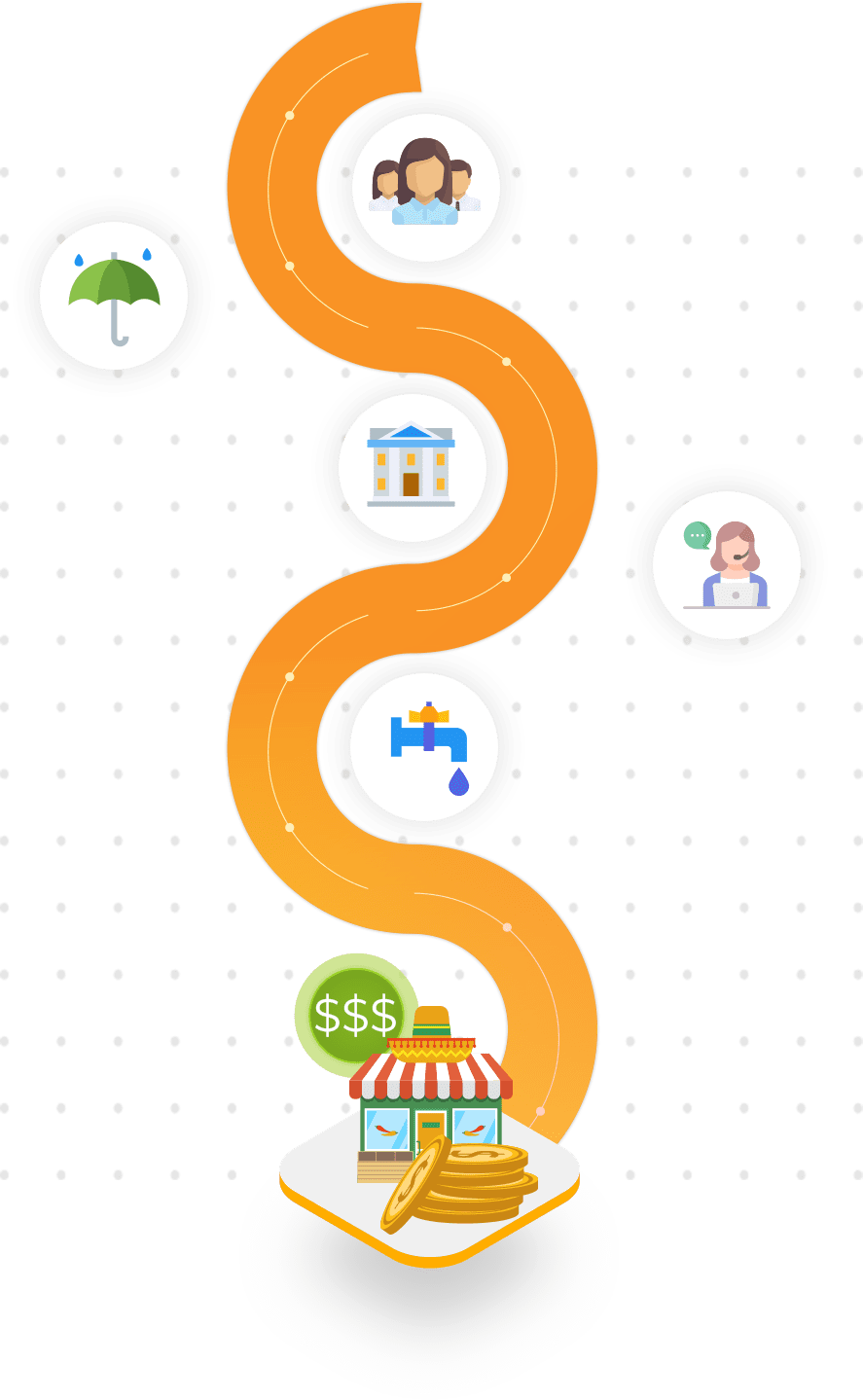

Small businesses that choose Profit Frog
A short history of scenario planning
Scenario planning got its start in the military, which used it to imagine different “war games” and their outcomes. In the aftermath of WWII, scenario planning began to infiltrate the civilian and corporate world.
Click on the arrows to see some stories*
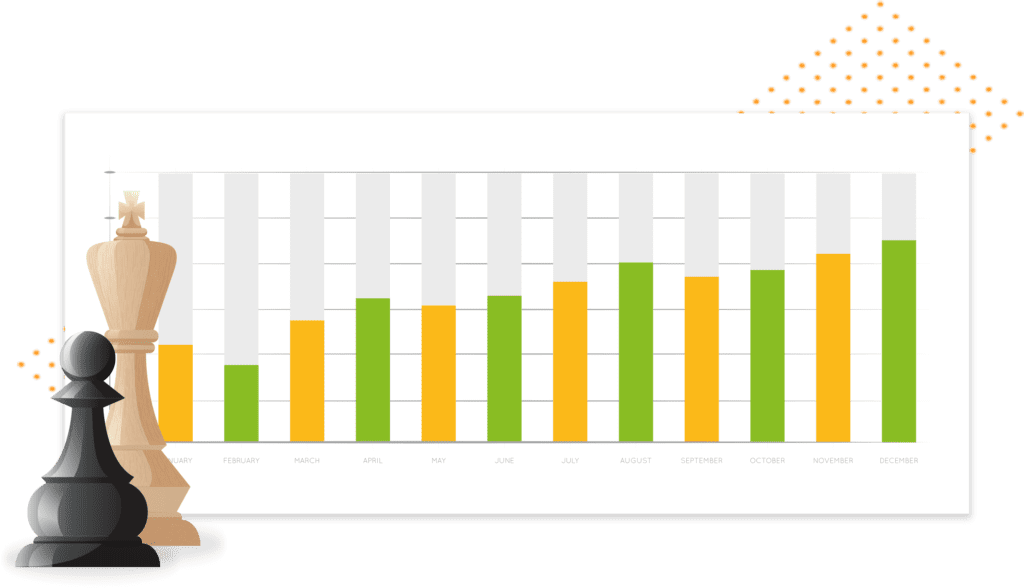
A short history of scenario planning
Scenario planning got its start in the military, which used it to imagine different “war games” and their outcomes. In the aftermath of WWII, scenario planning began to infiltrate the civilian and corporate world.
Click on the arrows to see some stories*

Herman kahn and the hudson institute
Herman Kahn was a systems theorist and pioneer of scenario analysis who popularized the term “scenario” in the 1960s. Kahn founded a scenario-based think tank, the Hudson Institute, in 1961. Hudson initially prioritized defense-related scenario planning and its theories of nuclear deterrence and escalation were influential within the Kennedy administration. Hudson then began to focus on scenario planning in economics; Kahn successfully predicted Japan’s economic rise.
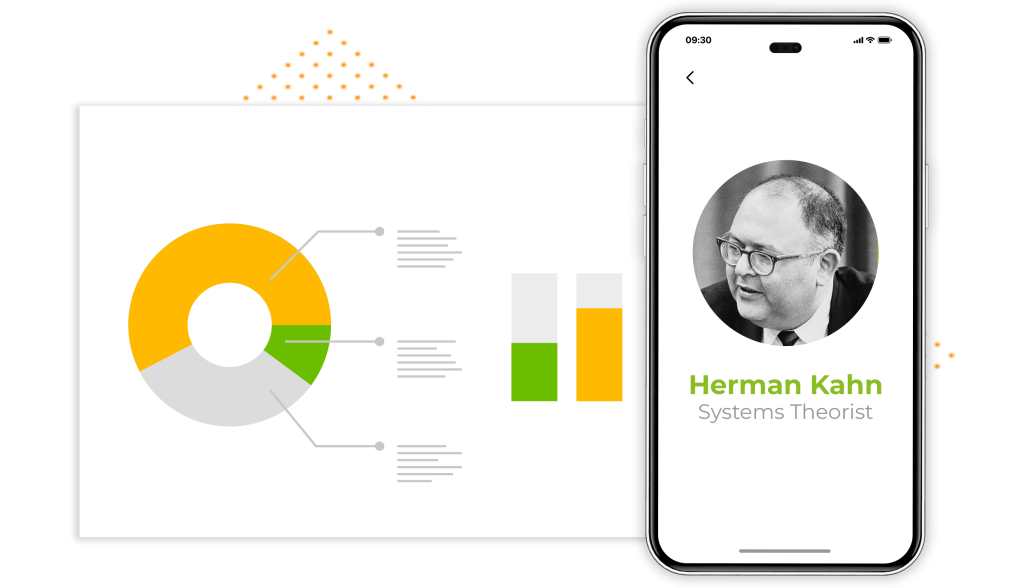
Herman kahn and the hudson institute
Herman Kahn was a systems theorist and pioneer of scenario analysis who popularized the term “scenario” in the 1960s. Kahn founded a scenario-based think tank, the Hudson Institute, in 1961. Hudson initially prioritized defense-related scenario planning and its theories of nuclear deterrence and escalation were influential within the Kennedy administration. Hudson then began to focus on scenario planning in economics; Kahn successfully predicted Japan’s economic rise.

Royal dutch shell and scenario planning
Pierre Wack, a disciple of Herman Kahn, implemented scenario planning exercises in Royal Dutch Shell in the 1970s, and Shell has been using scenario planning ever since. Wack and subsequent members of the company’s scenario team have been able to successfully model global trends and plan against them. Shell’s set of scenarios have helped the company anticipate and adapt global business operations to the oil shocks of the 1970s, the collapse of European communism, the Great Recession of 2008, and other volatility.
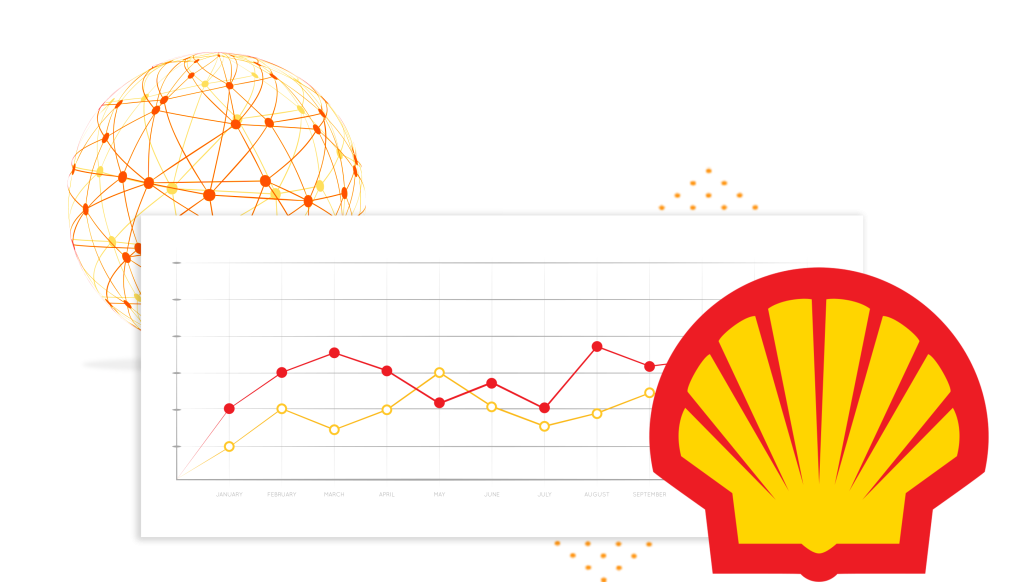
Royal dutch shell and scenario planning
Pierre Wack, a disciple of Herman Kahn, implemented scenario planning exercises in Royal Dutch Shell in the 1970s, and Shell has been using scenario planning ever since. Wack and subsequent members of the company’s scenario team have been able to successfully model global trends and plan against them. Shell’s set of scenarios have helped the company anticipate and adapt global business operations to the oil shocks of the 1970s, the collapse of European communism, the Great Recession of 2008, and other volatility.

Scenario planning examples
Royal dutch shell
Here are a few Shell scenarios:
- The Sky scenario: imagining meeting the climate goals of the 2015 Paris Agreement and the changes that would need to occur to mitigate climate change
- Rethinking the 2020s: 3 scenarios that explore the long-term ramifications of the COVID-19 pandemic
- Digitalization: exploring how digital technologies might continue to change the world as we know it.
Shell’s executive leadership has benefited tremendously from their investment into scenario planning. With a strategic foresight gained from knowing their strategic options and the key factors driving them, Shell has been able to develop contingency plans for an uncertain future. This has helped them with investor relations, and cost management—not to mention positioning the company to capitalize on global business trends rather than getting sideswiped by them.
A profit Frog scenario planning case study
Kenton Landscaping has been growing steadily for the past year and has plateaued in their small city. They want to expand and are considering the following options:
- Commute to other cities and offer services there
- Sign a lease in a new city for a permanent base there
- Focus on more high-margin services
Using Profit Frog, Kenton leadership builds scenarios for the three variables as follows:
Commuting
Commuting will increase gross revenues by 20% while increasing gas expenditures by $8,000 per month and payroll expenses by $5,000. Net profits decline even though revenues increase.
New Building Lease
As with commuting, leasing a building in a new city will increase revenues by 20%. Payroll will increase by $5,000—again, the same number as for the commuting scenario. Lease and utilities for the new building will cost $4,500. Profit margins increase from 6.5% to 8% and net profit increases by nearly $3,000.
High-Margin Services
Profit Frog shows Kenton that their highest-margin service is cleanups in the spring and fall. Increasing cleanups makes sense.
New Building and Cleanups
Profit Frog’s scenario planning project clearly reveals that the best course for Kenton Landscaping is to lease the building in the new city while investing $1,000 per month in marketing cleanups. Total profits go up by more than $6,000 per month and profit margins increase from 6.5% to 10%.
What Profit Frog customers are saying
“Profit Frog has completely transformed the way I run my small business. Their accounting system is user-friendly, efficient, and has helped me stay on top of my finances. I highly recommend it to any small business owner.”
Santiago
SSCHAMBERGER
As a small business owner, keeping track of finances can be overwhelming. Profit Frog has made it easy for me to stay organized and on top of my accounting. The system is intuitive and has saved me a lot of time and stress.
Dario G.
Entrepreneur
I’ve been using Profit Frog’s accounting system for several months now and it has been a lifesaver. The reports and insights it provides have helped me make better financial decisions for my business and I couldn’t be happier with the results.
Donna
Small Business Owner

Scenario planning vs strategic planning
Strategic planning and scenario planning share a lot in common, but differ in the following respects:
- Strategic planning assumes a known future outcome and strategizes how to get there
- Scenario planning assumes a dynamic, chaotic future and helps you plot the course to maximum profitability through all the unknowns
In other words, strategic planning is a more static process and is disrupted by variability, where scenario planning is designed to navigate variability.
Profit Frog’s scenario analysis is designed to be dynamically updated as conditions change. This sort of dynamic planning is much more effective and actionable than many static planning models.

What is a scenario planning process?
The scenario planning process was pioneered by the US military. In business, scenario planning refers to tools for strategic thinking in times of critical uncertainty. Scenario thinking can identify a range of potential outcomes for a business decision, making it easier for business owners to take steps in the right direction.

Why is scenario planning important?
Scenario planning is important because no business owner wants to be a victim of circumstances. By modeling various potential outcomes, you can be prepared for 3 levels of potential outcomes for any variable you choose to model:
- The best-case outcome
- The most likely outcome (in between the best and worst cases)
- The worst-case outcome
Scenario planning allows you to model all sorts of profitability drivers within your business, and how they might respond to external events or trends:
- Cost of goods sold and other expenses
- Labor costs
- Supply chain issues
- Pricing increases
- Sales cycles
- …and much more

Scenario planning: advantages and disadvantages
Scenario planning gives business owners a decisive edge. The value of scenarios is that they give you a look into alternative futures before they occur. Here are a few of the advantages of scenario planning:
- helps business owners understand the effects of each decision
- helps your teams (finance, operations, etc.) prepare initial responses to various scenarios
- helps businesses take proactive risks they are most likely to profit from
- helps small businesses avoid common pitfalls by identifying their focal issue and actions planned for worst-case scenarios
The only disadvantage of scenario planning is that it takes time and effort. Until Profit Frog, that is. Profit Frog makes scenario planning super easy.

Scenario planning vs strategic planning
Strategic planning and scenario planning share a lot in common, but differ in the following respects:
- Strategic planning assumes a known future outcome and strategizes how to get there
- Scenario planning assumes a dynamic, chaotic future and helps you plot the course to maximum profitability through all the unknowns
In other words, strategic planning is a more static process and is disrupted by variability, where scenario planning is designed to navigate variability.
Profit Frog’s scenario analysis is designed to be dynamically updated as conditions change. This sort of dynamic planning is much more effective and actionable than many static planning models.

What is a scenario planning process?
The scenario planning process was pioneered by the US military. In business, scenario planning refers to tools for strategic thinking in times of critical uncertainty. Scenario thinking can identify a range of potential outcomes for a business decision, making it easier for business owners to take steps in the right direction.

Why is scenario planning important?
Scenario planning is important because no business owner wants to be a victim of circumstances. By modeling various potential outcomes, you can be prepared for 3 levels of potential outcomes for any variable you choose to model:
- The best-case outcome
- The most likely outcome (in between the best and worst cases)
- The worst-case outcome
Scenario planning allows you to model all sorts of profitability drivers within your business, and how they might respond to external events or trends:
- Cost of goods sold and other expenses
- Labor costs
- Supply chain issues
- Pricing increases
- Sales cycles
- …and much more

Scenario planning: advantages and disadvantages
Scenario planning gives business owners a decisive edge. The value of scenarios is that they give you a look into alternative futures before they occur. Here are a few of the advantages of scenario planning:
- helps business owners understand the effects of each decision
- helps your teams (finance, operations, etc.) prepare initial responses to various scenarios
- helps businesses take proactive risks they are most likely to profit from
- helps small businesses avoid common pitfalls by identifying their focal issue and actions planned for worst-case scenarios
The only disadvantage of scenario planning is that it takes time and effort. Until Profit Frog, that is. Profit Frog makes scenario planning super easy.
Start your free trial today
Get a better understanding of your profitability. Start your free 14-day trial of Profit Frog, no credit card required.
Get a better understanding of your profitability.
Start your free 14-day trial of Profit Frog, no credit card required.